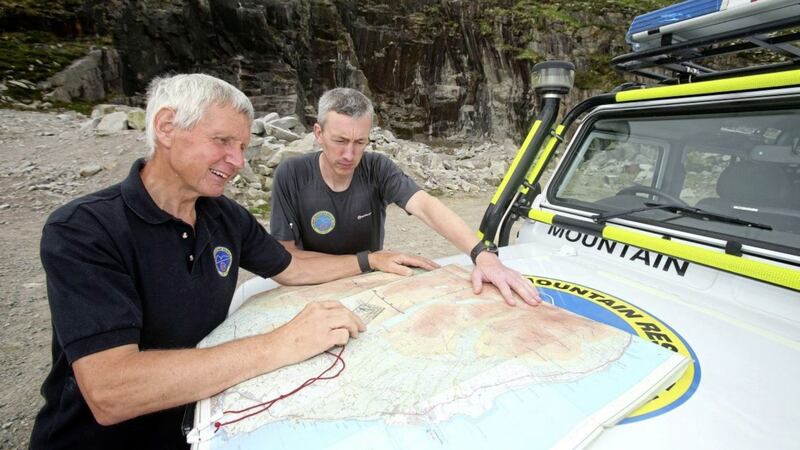TREKKING up the Mournes, in all weathers and at all times of the day, carrying at least 25 kilos of kit along with a 100-metre rope or a stretcher, are the men and women of Mourne Mountain Rescue team (Mourne MRT).
The volunteers, all 35 of them, literally drop what they are doing, leaving jobs, partners and children behind, when they receive a text alert to say that the PSNI has called them out to an emergency to help someone off the very beautiful, but potentially dangerous Co Down mountain range.
The team's work can range from helping people with sprained or broken ankles or legs, to a race against the time to bring walkers with serious head or spinal injuries safely off the mountain to receive life-saving medical care.
Former fishing skipper Harry Teggarty is just one of the unsung heroes of the team, which responded to 44 calls for emergency help last year. A spry 66-year-old, he's the oldest member of the team but that has not stopped him becoming a vital member.
A competitive mountain runner who reached the top of Slieve Donard in a mere 56 minutes recently, Harry plans to run 50 mountains – that's 60 miles with a 6,000m climb in total – in 24 hours at the end of this month, a challenge he has previously completed.
He says that the real thrill of his work with Mourne MRT is helping people.
"It's a race against time to get to the person – every minute counts. It can take a major effort to carry the person off the mountain because if it's dark or bad weather, the rescue helicopter can't help, so it's down to us,” Harry told me at his home which overlooks Annalong harbour. He was looking fresh even though he and other team members responded to a call-out late the previous night when a light aircraft crashed, but were 'stood down' from their base at the Newcastle police station before full mobilisation.
"My first responsibility on the mountain is to ourselves and our team members. We don't rush in without assessing the potential danger that could hurt us or further hurt the injured person. We then do a systematic check of the person's airway, breathing and circulation.
“The worse the weather, the more determined it makes you. Sometimes we can be searching for hours in the dark, but when you find the person, well, that's what we are there for. We are there to help people – that's it."
Harry said that volunteering with the Mourne mountain rescue team was something he wished he'd done years ago "but I didn't know if I would have been up to it".
"I had always admired the mountain rescue team but I never thought to join it until a friend suggested that I try it. He knew that I knew every inch of the mountains, loved being on them and would be a good help to them," he said.
"I did a mountain leadership course first, just for myself, and then applied for it and was accepted. After a year's training, I became a team member.”
That was seven years go and Harry has never looked back since. Edna, his wife of 44 years, and his daughters Elsa and Anne often worry about him when he's out at all hours, knowing that he, like the rest of the team, will keep going until he drops. They were particularly worried on the night he had just finished the Mourne Seven Sevens Challenge – running over the range's seven highest peaks – only to have to go back out into the mountains again on a call-out.
"What I enjoy most about it is that you're learning all the time, whether it’s first aid or rope work. It’s always a challenge," continued Harry, who practices his rope knots sitting at the kitchen table in the evenings.
"You have to test yourself constantly to do new things. There's new qualifications and experience to be gained for first responders, along with training in searching and first-aid training. The more you learn, the better it is for yourself, as you never know when it will be needed."
Harry became a fisherman in Kilkeel, where he was raised, when he left school at the age of 15.
“The fishing got bad and there was no money in it so I went to a job to tow barges in Belfast Lough before moving to work in a hardware shop in Kilkeel for about 20 years. I now work as a furniture delivery man,” said Harry.
“I've always loved the mountains as my mother was born on the foot of Wee Binnian [in the Silent Valley] and my father was a fisherman, so I have a connection to both the sea and mountains.”
Harry was one of the volunteers on the call-out to help the hillwalker who was seriously injured after falling 50 metres on the water slabs near Slieve Binnian early last month. The MRT, along with the Irish coastguard who provided the airlift to the Royal Victoria Hospital in Belfast, a paramedic and ambulance crew, worked together to save the man's life. Thankfully, he’s now recovering well from his injuries.
Mourne Mountain Rescue were the first responders there and were the last off the mountain in that rescue. But all were delighted with the outcome.
"It's all about teamwork. We work as a team and do everything we can together to help one another to help the people who need it," Harry said.
The wider rescue team in that call-out included, poignantly, the new crew of the Irish Coastguard Rescue 116 helicopter, underlining just how hazardous rescue work can be. The previous crew were killed just a month earlier when their helicopter crashed off the coast of Co Mayo during a sea search.
"We knew those boys well and had worked and trained with them," Harry recalled sadly. "We helped with the search for them – that was heartbreaking. The families were there and there was no sign of them. That was very hard."
It's not always feasible for helicopters to be involved in mountain rescues and Harry admitted that some of the most difficult call-outs involve the team stretchering people off the Mournes, being almost "on our knees coming down" due to the sheer physical effort.
"The stretcher work would be heavy and very hard, but we have to do it," he said.
'DROP EVERYTHING'
:: Mourne Mountain Rescue was founded in 1962 – other such organisations, such as the Kerry Mountain Rescue Team and the An Óige Mountain Rescue Team (now Dublin and Wicklow MRT) were founded later.
:: The team, comprising 31 men and four women, responded to 44 emergency call-outs last year. They have covered an average of 35 per year over the past five years.
:: The volunteers are from a range of occupations – teacher, bricklayer, barrister, mountaineering instructor, joiner, doctor, vet, painter, nurse, engineer, stonemason, community worker, etc
:: The service is run on voluntary and charitable donations and costs around £60,000 to run, including vehicle and equipment replacement.
:: To donate, visit www.justgiving.com/mournemrt







